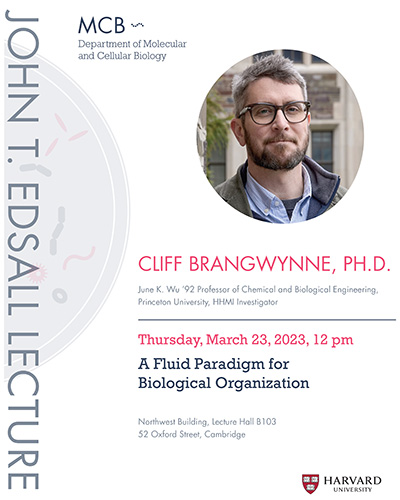Clifford “Cliff” Brangwynne will deliver the 2023 Edsall Lecture on March 23 at noon in the Northwest Building, B103.
Brangwynne is an HHMI investigator and Professor at Princeton University. He completed his undergraduate studies in physics at the University of British Columbia, Canada, then earned his Ph.D. in biophysics from Harvard University in 2008, working with David Weitz. After completing his Ph.D., Brangwynne was a postdoctoral fellow with Anthony Hyman at the Max Planck Institute for Molecular Cell Biology and Genetics in Dresden, Germany. Cliff joined the faculty at Princeton in 2011 and currently holds the position of Professor in the Department of Chemical and Biological Engineering.
Brangwynne’s research focuses on the physical principles underlying intracellular biological organization. By combining concepts and tools from soft matter physics and molecular cell biology, he has made significant contributions to the understanding of phase separation in cells, including the discovery of membrane-less organelles and the role of RNA in the formation of liquid droplets. His group recently developed a suite of biophysical tools, including new optogenetic platforms, allowing them to engineer phase transitions at defined genomic loci and examine their effects on genome organization and transcriptional activity.
Brangwynne’s pioneering work on phase transitions has been incredibly influential, spurring groups working in a wide range of different biological and biophysical fields to explore how phase transitions play critical roles in many different biological processes across the domains of life. According to Google Scholar, his papers have been cited over 20,000 times, including about 15,000 citations since 2018.In recognition of his research achievements, Brangwynne has received numerous awards and honors, including the Breakthrough Prize for Life Sciences in 2023, a Packard Fellowship for Science and Engineering, a MacArthur Fellowship, and an NIH Director’s Pioneer Award. He is also a fellow of the American Association for the Advancement of Science and a member of the National Academy of Sciences.
by Ethan Garner
About the John T. Edsall Lecture
The Edsall Lecture is given annually in honor of John Edsall, a member of the faculty of Harvard University from 1928 to 1973, when he became emeritus but remained engaged in research for more than 20 years. He died in 2002 a few months short of 100 years of age. Dr. Edsall’s scientific career started in Edwin J. Cohn’s Department of Physical Chemistry at Harvard Medical School, where he studied the properties of the muscle proteins and of the amino acids. These studies among many others led to the 1943 book by Cohn and Edsall, Proteins, Amino Acids and Peptides as Ions and Dipolar Ions, which became a classic in the field of protein chemistry. During World War II he had a key role in isolating blood proteins for the war effort and developed fibrin foam, a porous form of a fibrin clot for use in neurosurgical procedures. In 1954, Dr. Edsall joined the Faculty of Arts and Sciences and moved to the Biological Laboratories, where he started research on carbonic anhydrase. He was greatly concerned with education. He was a tutor in the biochemical sciences concentration for 40 years and Head Tutor from more than 25 years. He taught a course on biophysical chemistry at the college from 1940 until he retired; the course led to the writing of a textbook with his closest scientific colleague, Jeffries Wyman. He had a leading role in 1954 in the formation of the Committee on Higher Degrees in Biochemistry, a graduate program leading to the PhD degree in biochemistry; the committee became the Department of Biochemistry and Molecular Biology in 1967. Dr. Edsall was also a champion in the fight for the freedom and integrity of science.
by Guido Guidotti



